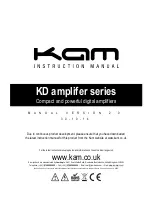
Page 1
Page 4
VHF/UHF Amplifiers
PD
2011-9043-01
INSTALLATION INSTRUCTIONS
These amplifiers are ideal for use in small digital and analogue reception and distribution systems. All
Mk 3 products feature a filtered dual-band VHF input which accepts signals in both Bands II and III,
allowing use for Band III DAB or TV, as well as for FM radio.
Features whole range
n
Separate VHF and UHF inputs.
n
New dual-band VHF input for Band II FM radio and Band III DAB or TV.
n
4-, 6- and 8-way versions available.
n
Low noise figure and high output capability.
n
New equipotential bonding terminal added on Mk 3 versions.
Features proAMP24, 26 and 28
n
Traditional multi-way aerial signal amplifiers.
n
Line power available at UHF input 12 V at up to 100 mA.
n
Higher-gain FULL output on 6- and 8-way versions allows expansion beyond eight points.
n
IEC connectors.
Features R versions
n
7 MHz return path for Sky* infrared remote control systems.
n
Built-in power for IR eyes on all outputs.
n
F connectors.
Note: R versions do not have input line-power capability or FULL outputs.
Fixings
Fix the amplifier to a sound vertical surface such as a wall or equipment mounting board. Ventilation
gaps of at least 50 mm should be left around the front and all sides of the unit. More clearance will be
required below and to the right of the unit to allow access for the signal cables.
Do not leave the amplifier resting on a carpet or install it where it may become smothered
with curtains or other soft furnishing fabrics. When installing the amplifier in a roof space
ensure that it will not come into contact with thermal insulation material.
Signal connections
To preserve RF screening integrity the signal connections to the amplifier should be made using good
quality coaxial cable and connectors. This is particularly important with digital terrestrial TV (DTT) to
minimise the ingress of impulsive electrical interference from home appliances.
n
The use of cable benchmarked under the CAI scheme is recommended.
n
Amplifiers proAMP24, 26 and 28 Mk 3 require IEC connectors (IEC 61169-2).
n
Amplifiers proAMP24R, 26R and 28R Mk 3 require Type-F connectors (IEC 61169-24).
For both connector types the use of crimp connectors, used in accordance with the manufacturers
instructions will give the best results. The importance of achieving sound braid connections cannot be
over-stressed. F connectors should be tightened with a spanner, not left finger tight.
Important:
the FULL output (where fitted) must always be terminated in a well-matched 75
Ω
load.
The terminator plug supplied
must
be fitted if this output is not used.
Proception Limited,
177-187 Rutland Road
SHEFFIELD
S3 9PT
United Kingdom
Web:
http://www.proception.co.uk/
e-mail: [email protected]
Performance data given are typical unless otherwise stated. Proception Limited reserves the right to change
product designs and specifications without prior notice.
proAMP24 & 24R Mk 3
proAMP26 & 26R Mk 3
proAMP28 & 28R Mk 3
2-Year Guarantee
This guarantee covers failure of your
PRO
ception product resulting from manufacturing defect
within a period of 2 years from the date of supply to the end-user. This guarantee does not
cover damage to the product caused by abuse, tampering, defective installation or natural
causes such as lightning discharge. Repair or attempted repair, other than by the manufacturer,
will render this guarantee void. This guarantee does not affect a consumers statutory rights.
* Sky is a registered trademark of British Sky Broadcasting Group PLC.
Safety Instructions
OVERHEATING
These amplifiers are intended for use in moderate climates only. They should not be used in
tropical regions. The recommended ventilation clearances and other precautions given in the
relevant section of this instruction leaflet should be observed to prevent overheating. No unit
should be fixed where it is likely to become smothered by soft furnishing fabrics such as curtains,
or by thermal insulation material in a roof space or building void. Mains powered equipment
should not be left resting on a carpet.
WATER AND FIRE RISKS
The appliance is not waterproof. It is intended for indoor use only and must not be fixed where
it could be exposed to dripping or splashing water. Objects containing liquids should not be
placed on or near the appliance. To prevent risk of fire, no object with a naked flame should be
placed on or near the appliance, or its associated wiring.
MAINS PLUG AND DISCONNECTION FROM THE SUPPLY
The appliance is supplied with a standard fused plug fitted. If this is unsuitable, refer to the
instructions below. If you need to change the fuse in the fitted plug, a 3 Amp fuse to BS 1362
carrying the ASTA or BSI approval mark must be used. Always replace the plastic fuse carrier
when renewing the fuse. The plug (or other means of disconnection from the supply, if used)
should remain readily accessible for operation when necessary. The LED power indicator on
this equipment should not be regarded as providing reliable indication of supply disconnection.
CHANGING THE PLUG
If the fitted mains plug is not suitable for the socket-outlets in use, it should be cut off and a
new plug fitted.
Wiring the new plug:
Instructions supplied with the new plug should be followed. The brown
wire must be connected to the line (L) terminal of the plug and the blue wire to the neutral (N)
terminal. Neither wire should be connected to the earth (E) terminal of a 3-pin plug (the
appliance does not require an earth connection). Ensure that the cord grip in the plug is correctly
used and clamps the sheath of the cord firmly.
Fuse Rating:
If the new plug is a fused type, the fuse fitted should be rated at not more than
3 Amp.
Caution:
The old plug should be destroyed immediately since it would be dangerous if plugged
into a live socket.
PRO
ception




















